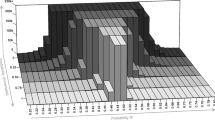Abstract
There is a contemporary conflict between individualistic andcommunitarian conceptions of rationality. Robert Goodin describes it asa conflict between an enlightenment individualistic conception of a``sovereign artificer'' and ``a socially unencumbered self'' ascontrasted with the communitarian conception of a ``socially embeddedself'' whose identity is formed by his or her community. Should wejustify and explain rationality individualistically or socially? This isa false dilemma when consensus is reached by a model articulated byKeith Lehrer and Carl Wagner. According to this model, the consensusresults from the positive weights individuals give to others and use tocontinually average and, thus, aggregate their allocations. Aggregationconverges toward a consensus in which the social preference and theindividual preferences become identical. The truth of communitarianismis to be found in the aggregate and the truth of individualism in theaggregation. The original conflict dissolves in rational consensus.
Similar content being viewed by others
Author information
Authors and Affiliations
Rights and permissions
About this article
Cite this article
Lehrer, K. Individualism, Communitarianism and Consensus. The Journal of Ethics 5, 105–120 (2001). https://doi.org/10.1023/A:1011925405156
Issue Date:
DOI: https://doi.org/10.1023/A:1011925405156




